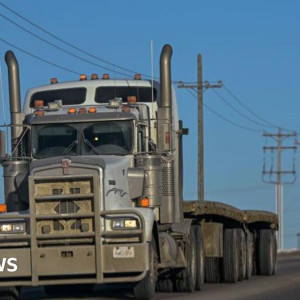Trucking’s uneasy relationship with new tech


Vancouver-based Freightera is among the biggest players when it comes to digital trucking services in Canada.
Co-founder Eric Beckwitt meets me at a point overlooking the city's sprawling port, where towering orange cranes move brightly coloured containers against a backdrop of snow-topped mountains.
When he started the company in 2014, there were no trucking apps for Canadian companies.
The service he has developed allows drivers and customers to search 20 billion regular routes for hauling freight which, he says, can be done in "five or 10 seconds".
He points out that, unlike other platforms, Freightera does not set prices.
"At Freightera, carriers set their own price.
We ask them what they need to be healthy and profitable on each lane, and they set the price."
Mr Beckwitt says the service has been good for trucking.
Before services like his came along, finding work, or even the best route, was like "finding a needle in a haystack", the Freightera boss explains.
"Carriers really appreciate Freightera's reliable demand for service, which has grown every year consistently, right through Covid, the inflation afterwards and the current freight recession, one of the largest running freight downtowns," he says.
The company is now developing AI to speed up complicated bookings: "Digging through the noisy, messy documents, fine print and inconsistent rules - things like missing paperwork, unexpected charges, or a routing issue that could throw off delivery."
Mr Beckwitt also dreams of a completely automated freight industry, "40 years from now", where AI would control global freight.
"Automatically assigning cargo to networks with the lowest capacity and allowing complete transparency, tracking and even trading while they're in travel".